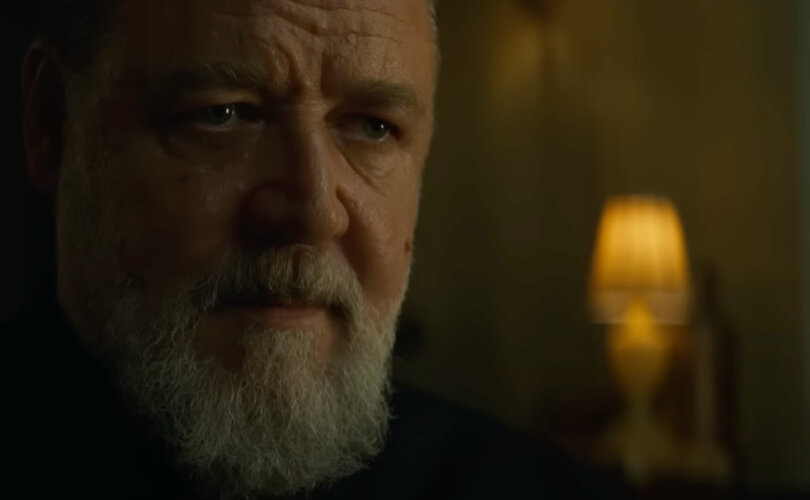ROME (LifeSiteNews) — A group of exorcists has strongly criticized Russell Crowe’s new blockbuster film about the group’s founder, stating the film is “cinema splatter” aimed at “arousing strong and unhealthy emotions.”
The International Association of Exorcists (IAE), founded in 1990 by Father Gabriel Amorth and approved by the Vatican in more recent years, issued a statement March 7 roundly condemning a film about Amorth, due to be released April 14. “The vision of the trailer of the film confirms, if necessary, not only its quality as a cinema splatter, a true sub-genre of horror cinema, but its unreliability on such a delicate and relevant issue,” wrote the group.
READ: Exclusive: Interview with Rome chief exorcist Fr. Gabriele Amorth
Titled “The Pope’s Exorcist,” the film stars well-known actor Russell Crowe, who has billed the film as being based on Amorth’s own memoirs and writings. A member of the Pauline order, Amorth was appointed the chief exorcist of the Diocese of Rome in 1985. He stated in 2013 that he had driven out 160,000 demons during his prolific career of many thousands of exorcisms.
Amorth, who died in 2016 aged 91, arguably became more of a household name among Catholics with the publication of his English language books “An Exorcist Tells His Story” and “An Exorcist, More Stories.” Widely recognized as the Church’s most knowledgeable and experienced exorcist, Amorth warned how faith had been replaced by “superstition, magic, Satanism, or Ouija boards,” all of which “open all the doors to the presence of demons.”
READ: Exorcist calls Holy Spirit Board game a deception of the devil that’s actually a Ouija board
“The Pope’s Exorcist,” costing $18 million to produce, has attracted considerable attention, both due to Crowe as lead actor but also due to the subject matter involving the occult and the Catholic Church.
Crowe has stated that “obviously the way things are portrayed in the movie are specific to the art of filmmaking and are designed to be a piece of entertainment.” Crowe reportedly studied Amorth’s writings, and the film came about due to the production company – Screen Gems, a subsidiary of Sony – buying the rights to the priest’s story.
READ: Porn addiction is an ‘opening to the demonic’: exorcist
But the IAE has warned against the film, stating that Crowe’s portrayal of Amorth does not represent the priest’s actions or manners. They accused the film star and producers of having missed the “spirit of service” that characterized Amorth “in his ministry of consolation.” The IAE continued:
The Catholic Church is then represented by an equally unbelievable pope, played by Italian actor Franco Nero. Finally, the Vatican environments, painted with the usual tried-and-true range of chiaroscuro hues, give the film a ‘Da Vinci Code’-esque effect to instill in the audience the usual doubt: who is the real enemy? The devil or ecclesiastical ‘power’?
With Amorth’s life revolving around many thousands of exorcisms, they naturally form part of the film’s plot, but the esteemed exorcist’s group warned that the film’s portrayal of such events was not factual: “As was the case in other films, everything is exaggerated, with striking manifestations on the physical and verbal level, typical of horror films.”
The IAE wrote the film’s presentation of Amorth’s exorcisms “besides being contrary to historical reality, distorts and falsifies what is really lived and experienced during the exorcism of truly possessed people that we, Catholic exorcists, celebrate according to the directives given by the Church.”
READ: Top Exorcist: Marian prophecies are coming True. Prepare for spiritual warfare NOW
They deemed the film to be “insulting with regard to the state of suffering in which those who are victims of an extraordinary action of the devil are placed.”
In addition to the film being “exaggerated” with regard to the priest and the person possessed, the IAE accused the film of being a danger to viewers. The film’s depiction of exorcisms is “a spectacle aimed at arousing strong and unhealthy emotions, thanks to a gloomy set design, with sound effects such as to arouse only anxiety, disquiet and fear in the viewer,” they wrote.
The end result is to instill the belief that exorcism is an abnormal, monstrous and frightening phenomenon, whose only protagonist is the devil, whose violent reactions can be confronted with great difficulty; which is the exact opposite of what occurs in the context of exorcism celebrated in the Catholic Church in obedience to the directives it issues.
But the group is not completely against films dealing with the occult, with one film in particular being recommended by the exorcists: “Libera Nos. The Triumph Over Evil.” The IAE praised the work for its “authentic” portrayal of an exorcist and exorcisms, including “how exorcism is a highly joyful event, because, as one experiences vividly the presence and action of Christ the Lord and the Communion of Saints, those who are tormented by the extraordinary action of the devil gradually find liberation and peace.”

